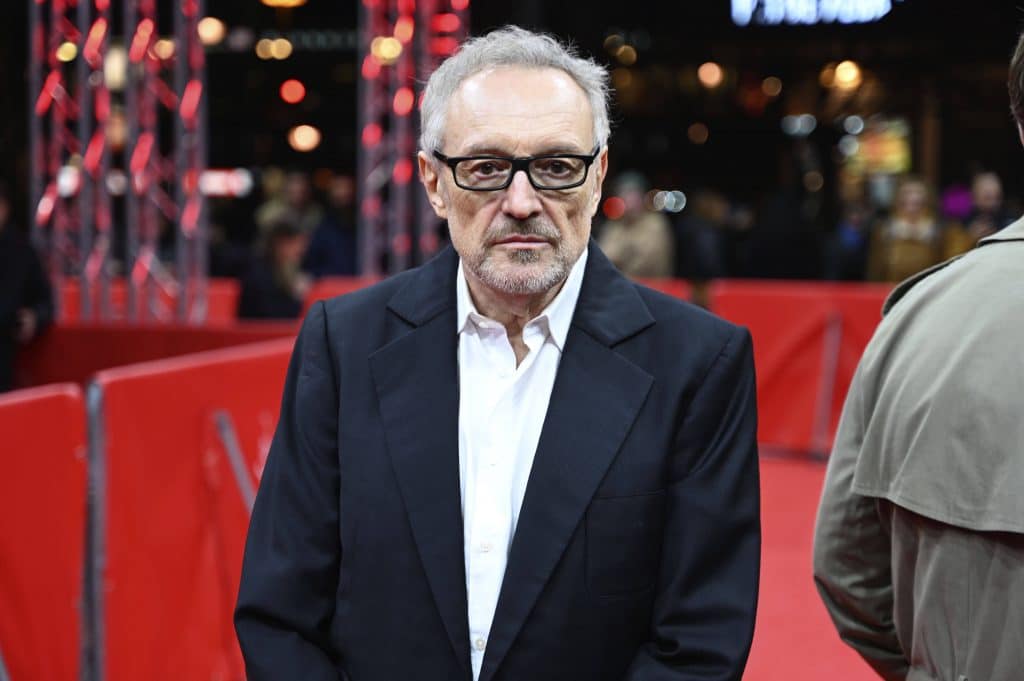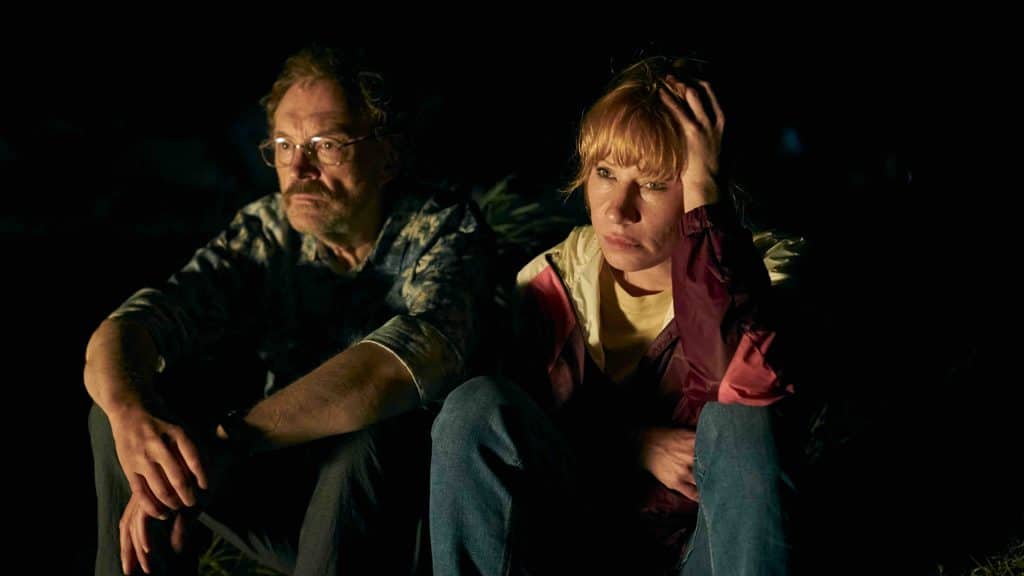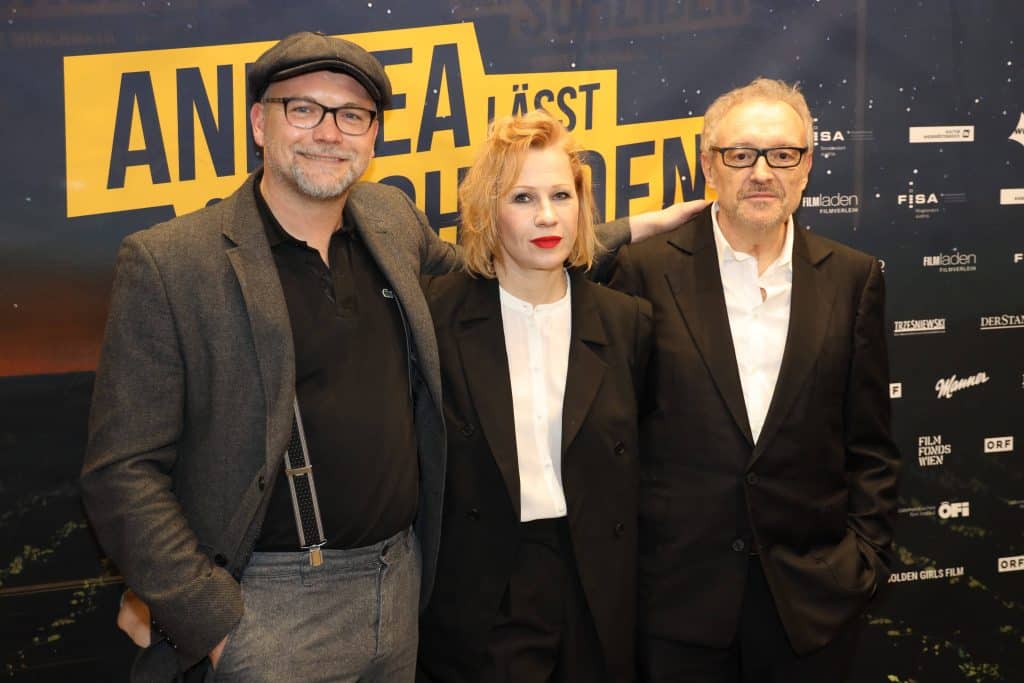“Andrea Gets Divorced“ has already had a super successful run in its homeland Austria, now Josef Hader’s new film starring Birgit Minichmayr is coming to German cinemas following its premiere at the Berlinale. A conversation with someone who likes to see things differently than others.

As you watch the movie, you ask yourself why you have to laugh so much in such a sad, serious film. You laugh, but at the same time the laughter gets stuck in your throat. Is that a question you ask yourself? Is „Andrea Gets Divorced“ a comedy, a drama, a tragedy?
Josef Hader: What you describe makes me very happy. My intention was to explore what humor can do when life’s problems are a bit bigger.
But it was supposed to be a funny movie?
Josef Hader: It should be a movie in which the humor is there, but doesn’t override the drama. There are often comedies which seem to claim that a dramatic conflict also exists, but the humor is so carefree, so unconcerned, that you lean back in the movie theater and think: „Well, I don’t have to take the real story seriously, it’s mainly about the jokes.“ I wanted to get as far in the other direction as possible, the problems should mean something and so should the laughter, although sometimes you might well be surprised at your own laughter. Or have the feeling that you’re laughing in the wrong place. I also try to do that in my cabaret programs.
Billy Wilder supposedly once said: Tragedy is when someone falls down and doesn’t get up again, comedy is when someone falls down and gets up again.
Josef Hader: Exactly. But it’s important that he or she has fallen down beforehand in a very credible way and that you’re still a bit scared as to whether he or she will get up or not. If I see someone fall down and I know they’ve already got up 50 times, there’s no tension.
Comedies have somewhat forgotten that they can also be deadly sad films. What came first in your film: the story, which was then followed by the consideration of where to put the humor, or was the humorous/weird view of this world there first and the story then emerged from that?
Josef Hader: Unfortunately, I’m someone who always needs a bit of theory before I can put it into practice. In the beginning, I had the idea of making a rural film because I had the feeling that I knew this microcosm quite well and wanted to describe it. The next thought was: a woman as the main character. Because women, especially when they have their own ideas, still encounter more difficulties in the countryside than men.
The character of Andrea as a woman who doesn’t have it easy in the countryside in a male-dominated structure is incredibly finely drawn…
Josef Hader: Birgit Minichmayr in particular drew her so! Because she really made the script so much better. Birgit is an actress who is not prepared to save a scene. That’s a great quality. Scenes that are saved are dead afterwards. Birgit looks at everything very carefully with the eyes of an outsider, not with the eyes of someone who has already written the tenth version of the script, and asks exactly the right questions. She made some scenes significantly better.
You say you know the world in which the story is set: To what extent are your own experiences reflected in it, to what extent have you processed your own experiences in it?
Josef Hader: I don’t like films in which film people from the city come to the country and realize their ideas what the hinterlands are. My aim was to do justice to what it’s really like in the countryside. Above all: not to denounce anyone. The film reflects, in many small details, my experience of the country where I spent the first 20 years of my life and now return again and again as a visitor. That was perhaps also the idea behind the project, to get a clearer idea about my experience of the country.

The beautiful thing is the loving look you take at it, despite exposing the mechanisms of how these people work together…
Josef Hader: Lovingly perhaps, but it’s more like an entomologist’s love for strange creatures. The enthusiasm for all the things that occur in nature. It was important to me to show how living together in a village community like this differs from living in the city. A tragic accident means something different within the village community than it would in the city.
Because everyone is involved…
Josef Hader: Because everyone is involved, because everyone knows each other. Ultimately, however, people are not closer to each other. People aren’t closer in the country, but they are more exposed to each other. In the city, I meet whoever I want, I can choose by district, pub, time of day. I never have to meet someone I want to avoid. In the country, you’re bound to bump into someone. Either at the gas station, which in many areas has taken on the role of the village inn, when shopping or at the municipal office…
The film takes a very revealing but also tender look at how men function…
Josef Hader: … and don’t function! They are all rather dysfunctional men. The story involves the main character walking through the movie a bit like a lonely cowboy because she has no one to confide in. This means that the men around her can’t be much help to her either. And these men all have their problems too. Andrea is not what you would expect from a woman in the country. But the men have just as much trouble fulfilling what a man in the country should be like. The interesting thing is always to show where we don’t live up to society’s expectations. We find that exciting in the movies because we are afraid of it ourselves. We always try to hide all our faults in life. But when we see them in someone in the movies, it makes us feel better. Of course, the biggest relief would be if we could tell each other our mistakes in normal life. But we just can’t do that. So you have to write about it in a novel or tell it in the movies.
Men fail because of the demands they place on their own masculinity…
Josef Hader: It’s the society, the community, that expects certain things from a man and certain things from a woman. For example, I was a man from the very beginning who couldn’t fulfill expectations. As a boy growing up on a farm, I was allergic to dust and couldn’t do a lot of the work that had to be done. I had hardly any contact with other children at pre-school age, which is why I was completely overwhelmed when I started elementary school. The demands within a peer group with children of the same age made me completely helpless. I was immediately the loner. So I know it very well when you don’t live up to expectations.

The peer group later becomes the “Beer Group” in the country…
Josef Hader: That comes later, exactly. Interestingly, I’ve always remained very skeptical about this kind of masculinity. To this day, you won’t see me regularly meeting a group of friends for a beer. I love meeting individual men, but I don’t like the group. With groups of men in any price range, I immediately get that childish feeling again: they’re the enemy.
Thomas Stipsits is a colleague in your film who – alongside yourself – is one of the most prominent Austrian cabaret artists. Did opposites clash there?
Josef Hader: We’ve known each other for a long time, at the very beginning of his career he performed at one of my evenings after the break. We both come from the countryside and initially have more in common than differences. At first I was a little hesitant to offer him the role. Not because I didn’t think he could do it – I knew he would do a great job. I just wasn’t sure if he would be up for this kind of role. Until I met him by chance at the bar of a cabaret stage in Vienna, we had a beer together and I told him about the project. He was immediately willing to take part. And Thomas makes so much of this role! Everything that’s in it, including the despair – great!
And you do the most brutal and radical thing you can do as a filmmaker: You kick the superstar out of the movie after 20 minutes.
Josef Hader: Yes, like Alfred Hitchcock in „Psycho“. That’s how I explained it to him, he was immediately interested…
It’s a very special kind of movie that you make. Is it easy for you to get these films off the ground in Austria?
Josef Hader: It might be easier for me to get money with a good script than it is for others with a good script. But I wouldn’t get anything with a bad script either. My projects probably attract a little more attention, and there is a system in Austria that allows you to find the money for films like mine. Nobody knows how long this will work, because pubcaster ORF, one of the biggest financiers, is increasingly considering pulling out. Financing is always a matter of uncertainty, especially when it comes to timing and planning: you never know whether there will be money in the year you need it. As a filmmaker, you have to be very flexible when it comes to scheduling. Unfortunately, the system doesn’t work in such a way that you can apply for funding this year for three years from now. You can only apply this year for this year. That is perhaps a point that could be improved. There would be much more planning security if the funding system were thought out in advance. But you also have to be happy that this system exists and that so many good and very different films are made possible in a small film country like Austria.
A small film country has advantages and disadvantages.
Josef Hader: The clear advantage is that you can be more colorful. In a large film country, many films are created on the drawing board. Certain German comedies, certain French feel-good movies with a light arthouse touch for the golden agers before they die: they’re all events like a Catholic mass. You know how the machine works after five minutes. But the temptation is not so great in Austria because you can’t really earn money with film here.
Is this part of filmmaking, the financing, something you deal with or have to deal with?
Josef Hader: For me, it’s not so much an existential problem as it is for those who make films as their sole profession. Some may still have a small teaching job or shoot commercials or for TV. But as a cabaret artist, I’m in a luxurious situation. If I don’t get funding in a year, I just do a tour. And if a funding committee rejects my script, I can always consider turning it into a cabaret play.
After „Wilde Maus“, you returned to the Berlinale with „Andrea Gets a Divorce“. How important is this part, the festival presence, to you? And then, in extension, the theatrical release?
Josef Hader: Cinema release and festival presence are two different things. The festival presence is a nice thing, it doesn’t affect me professionally in the same existential way as others who direct films full-time. But I am happy about it. The cinema presence is a different matter, because I’ve always tried from the outset – even with the cabaret programs – to manage the balancing act of ensuring that what I come up with has a certain subtlety and complexity and still appeals to an audience. That also applies to a new movie. Then I’m a real circus horse, doing things that I would never normally do.
For example, talking to us…
Josef Hader: That’s one of the more pleasant parts. The unpleasant part is TV shows, I don’t normally do that at all.
Thank you. Fishing for etc… When you say you’re a cabaret artist, you also do other things: What significance does filmmaking have for you? What desires does it satisfy?
Josef Hader: When writing, it’s the fun of developing and describing an entire microcosm and thus possibly being able to tell more about society than if you had to deal with a single character. There is also the joy of working together, which you don’t have as a solo cabaret artist. Working intensively with really good people – that’s great fun for me. But also because I do it so little. If I had to do it all the time, it would be hell for me, because I’m more of a soloist at heart. But I enjoy it as an excursion.
When you’ve finished a movie, are you satisfied with what you’ve achieved?
Josef Hader: No, of course not. That’s in the nature of things. I always see the things that didn’t turn out so well. But of course you’re also happy about the things that turned out better than you thought. You’re never satisfied with your own acting performance in any movie.
When you go to the movies, what do you like?
Josef Hader: Special films, often smaller films too. Recently, I found „Anatomy of a Fall“ absolutely incredible or, a few years back, „Manchester by the Sea“. I like movies about people.
Those are often the most difficult ones, because you can’t hide behind special effects.
Josef Hader: The good thing is that I have no training as a director and therefore wouldn’t know how to technically handle such distractions. I get on best when I take care of the characters, first as a writer and later in collaboration with the actors. Even the visuality is a great challenge and an excessive demand. I had a great DoP in Carsten Thiele. He also intervened in the script and gave his opinion, but at the same time he was completely open and let me into his work. Basically, when a run-of-the-mill cabaret artist comes along with no technical film know-how, the camera can always decide how much it wants to be influenced by him. Carsten really gave me the chance to help shape the visual language. We drove through the Weinviertel, he taught me about focal lengths and showed me on his iPad what the landscape could look like. I could never develop an idea of how we wanted to tell a movie on my own. Carsten and I discussed it for a long time so that the movie wouldn’t look like a social drama, so that it wouldn’t look like a movie that was too funny and wanted to make jokes with its locations. We talked for a long time about how we could make everything look real – hardly anything was built – and still not make the province look depressed.
In truth, you made a western.
Josef Hader: That’s right. Horizon, saloon and a cowboy, only it’s a female one. Or maybe you say Eastern when it’s set on the former Iron Curtain?
The interview was conducted by Barbara Schuster and Thomas Schultze.
